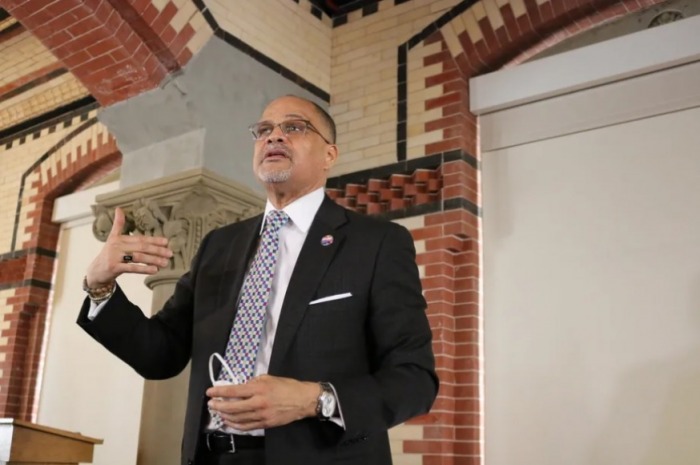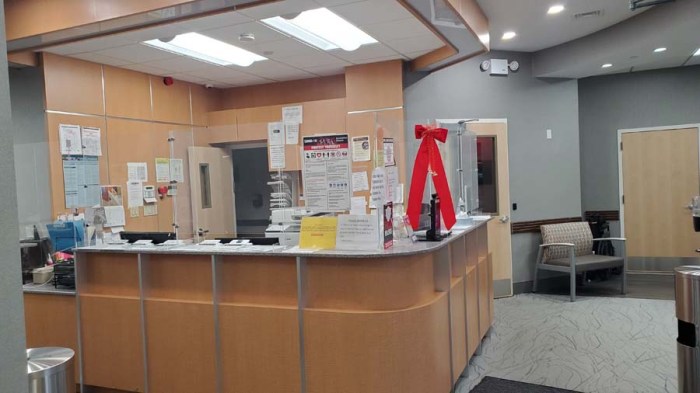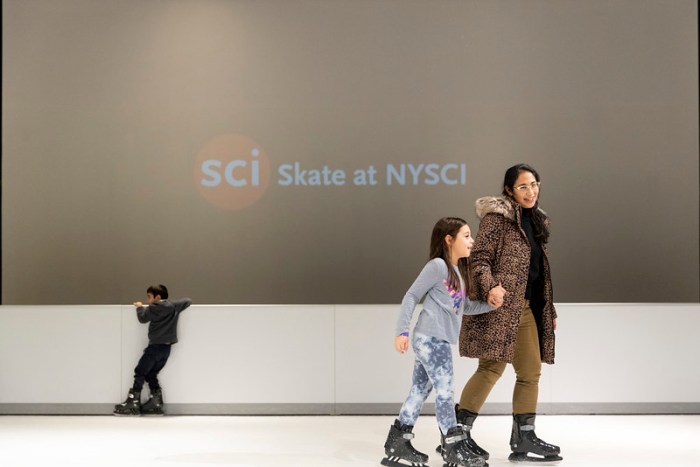
Chancellor David Banks takes questions from the press after giving a speech at Tweed Courthouse, the education department’s downtown Manhattan headquarters, laying out his vision for New York City Schools. Christina Veiga / Chalkbeat

This article was originally published by Chalkbeat New York on March. 2
BY
In his first major policy speech to education department brass, New York City schools Chancellor David Banks offered sharp criticism of the system he inherited.
His Wednesday address acknowledged sharp enrollment declines, lingering concerns over school safety both from violence and from COVID, and, three school years into the pandemic, a battered trust among families and school staff.
“There are so many things that are broken as I come here as chancellor. It’s amazing to me,” Banks said, his voice bouncing off the walls of the rotunda at Tweed Courthouse, the lower Manhattan headquarters of the New York City education department.
“Families decided to vote with their feet, and to say, ‘We’re going to find other alternatives and other choices for our children,’” he continued. “That’s an indictment of the work that we have done.”
Banks promised to move things forward by expanding what he called more relevant and exciting learning opportunities for students, building out virtual learning options, and lifting up and sharing what’s already working in classrooms. He called for a markedly different approach to literacy instruction, with a specific focus on students with dyslexia and expanding gifted education.
To get there, Banks said it will take an overhaul of the vast bureaucracy of the education department, announcing he would eliminate the relatively new position of executive superintendents and require district superintendents to reapply for their jobs.
He repeatedly noted the amount the city spends on its schools: $38 billion this year.
Unlike the last shift in administration, when then-Chancellor Carmen Fariña went about methodically undoing much of what her predecessors in the Bloomberg administration had implemented, Banks said he would borrow what he feels has worked under previous chancellors. His vision combines some of the central tenets under both Mayor Michael Bloomberg and Mayor Bill de Blasio.
“Every time you get a new mayor, you get a new chancellor, a lot of times the baby gets thrown out with the bathwater — maybe just start all over again with the new shiny thing,” Banks said. “We’re not interested in that. We’re interested in things that work and how you scale excellence all across the system.”
Banks also inherited the previous administration’s blueprint for helping students catch up after several pandemic-disrupted years, which includes increased and regular testing to determine where students stand academically and screening for social and emotional health. Banks did not lay out any of his own specific recovery plans.
Enrollment has dropped about 9% since the pandemic began in March 2020. But there is nuance in the numbers. Much of the drop has been driven by fewer new students coming into the system, according to a recent report from the Independent Budget Office, which also found that retention actually ticked slightly higher.
Inside the classroom
Some of the most notable changes are expected in the way students learn to read.
Following his speech, Banks said too many schools have used a method popularized by Lucy Calkins, a Columbia University Teachers College professor. The approach was lauded by former Chancellor Fariña.
“Across the city, it has not worked,” Banks said. “There’s a very different approach that we’re going to be looking to take.”
That approach includes a greater emphasis on explicit phonics instruction, he said, as well as a focus on students with dyslexia. He wants to partner with the well-regarded private school Windward on the Upper East Side, which is known for working with students with dyslexia.
Part of New York City’s challenge, however, may lie in the fact that the central education department doesn’t even track the kinds of reading curriculum used at each of its nearly 1,700 schools. Asked by reporters after his speech about whether schools would be required to adopt the same curriculum and how he would judge progress, he said those plans are still being made.
“We’re coming up with different approaches, how we will implement that, where we will implement it, and how we will measure it. You will hear more about it in the coming weeks,” Banks said.
He also said schools need to provide more interesting and relevant learning experiences, emphasizing the need for career and technical programs as well as access to field trips. He also wants to make sure students are taught financial literacy, and that they have access to real-life civics instruction by participating in student government.
Banks has also been a consistent supporter of expanding virtual learning. In prepared remarks, he called for a new Digital Learning Advisory Committee made up of educators, families, and students, pledging to build on the lessons learned through the pandemic to provide more options for students who preferred remote learning.
When it comes to gifted and talented programs, which have come under scrutiny for starkly underrepresenting Black and Latino students, Banks’ prepared remarks only briefly called for “opportunities for accelerated learning in every school,” saying that gifted programs would be scaled up “all over the city.”
Bureaucratic shake-up
Banks formally announced an organizational move that had been expected: The city’s nine executive superintendents will be eliminated. Former Chancellor Richard Carranza created the position in 2018, shortly into his tenure, in an attempt to provide more clear lines of accountability and support for schools. The hires reportedly cost $2.5 million a year.
Banks is also eyeing the borough support offices for potential cuts, he told reporters.
In shaking up the system, Banks is requiring the rest of the department’s superintendents to reapply for their jobs. (There are currently 46 superintendents, including those who lead each of the 31 districts, those in charge of high schools, and those leading certain special education programs.) Moving forward, the role will be newly empowered, he said, with bigger staff and increased resources.
“It’s very difficult to be a superintendent, and you don’t really have real authority,” he said. “When principals and families go to the superintendent, and the superintendent can’t get you an answer, because they got to go further up the chain of command — that’s not impactful. Doesn’t work.”
Banks also wants to celebrate effective principals and tap their expertise to lift up their peers. One initiative championed by Fariña that the new chancellor plans to revive is the learning partners program, which allows schools to visit and learn best practices from one another.
The chancellor also wants to give principals more autonomy, harking back to a pillar of the Bloomberg administration. Though the city is still working on a framework on what that might look like, Banks said the education department’s template is the autonomy zones piloted in the early 2000s under Bloomberg.
The approach gave more control to principals over hiring, budgets, and curriculum, in return for being held strictly accountable for student achievement.
“We are going to create a different paradigm for principals who know what they’re doing,” Banks said.
Chalkbeat is a nonprofit news site covering educational change in public schools.






